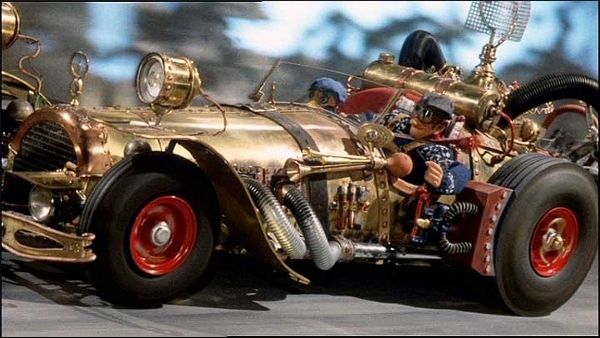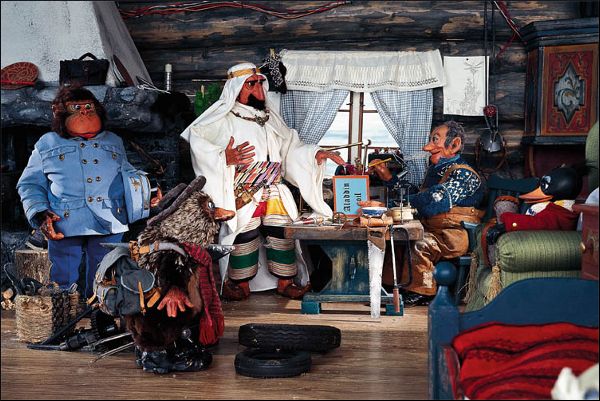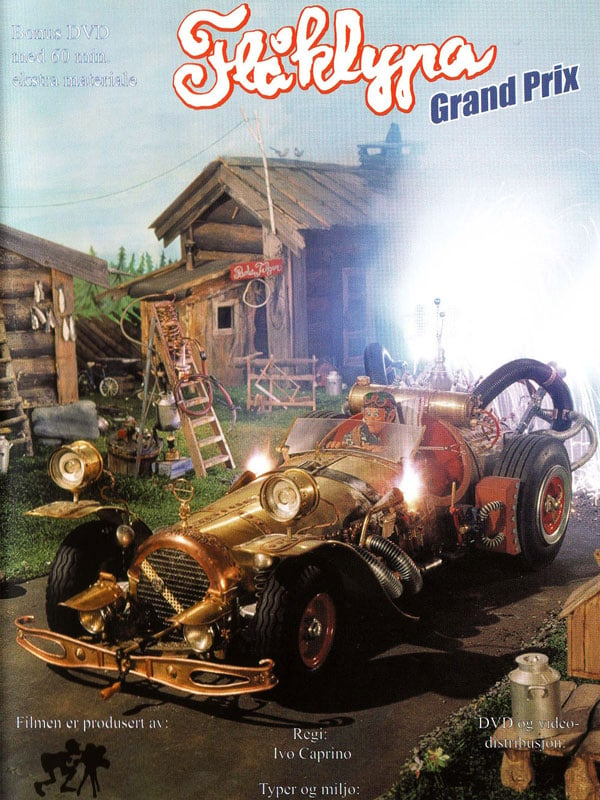When I started my BA in film three years ago, the lecturer asked the class on the very first day how many of us had not seen Pinchcliffe Grand Prix. Out of about a hundred students cramped into a tiny classroom, only two raised their hands. The point, of course, was that if there is one movie that practically every Norwegian has seen, it's this one.
Pinchcliffe Grand Prix – or Flåklypa Grand Prix, as it's known as in Norway – is a 1975 stop-motion animated film based on characters from the books of Kjell Aukrust (stop-motion is an animation technique in which people, dolls, clay figures, and/or objects are subtly moved or manipulated between individually photographed frames, so that the illusion of movement appears when the movie is projected). The film is directed by Ivo Caprino, one of the great kings of stop-motion, the likes of which have never been seen since his death in 2001. Caprino made beautiful stop-motion short films based mainly on Nordic fairytales, and if the name of Los Angeles-born stop-motion artist Ray Harryhausen is familiar to you, then imagine Caprino as his Norwegian counterpart. Pinchcliffe Grand Prix is by far his most popular work.
"If there is one movie that practically every Norwegian has seen, it's this one."
The movie takes place in the countryside, in a small place called – you guessed it – Pinchcliffe. The inventor Reodor Felgen (Theodor Rimspoke) lives together with his two animal friends, the energetic and optimistic magpie Solan (Sonny) and the depressed and pessimistic hedgehog Ludvig (Lambert). One day, they find out that Felgen's former assistant, Blodstrupmoen (Rudolph Gore-Slimey), has stolen his idea for a racecar engine and used it to become the world's greatest racecar driver. With the help of an Arab oil sheikh, the crew decides to make their own car to beat Blodstrupmoen’s.

The cast members might sadly be unknown to anyone who did not grow up watching them, but Pinchcliffe Grand Prix is filled with Norway's best classic-era actors. It's also interesting to note that, while this movie has been translated into 70 languages, the unrecognizable blabbering of Harald Heide-Steen Jr. as the oil sheikh's gorilla servant has remained untouched in every version. It makes me wonder how the countryside dialects used by the other characters were translated. These are variations of dialects from the county of Oppland, located in what could be called the very center of Norway, as it is the only county that is not bordered by the ocean or by another nation. How delightfully ironic, then, that a movie set in the very center of Norway spread out toward pretty much every corner of the country.
"The movie has sold 5.5 million movie tickets. Which might not seem like that much, until you realize Norway only has a population of 5 million."
The oil sheikh, I find, is one of the most interesting characters in the movie. Pinchcliffe Grand Prix was made in the seventies, which means a lot of cultures were still somewhat of a mystery for many Norwegians. The oil sheikh, Ben Redic Fy Fazan, has a very stereotypical way of speaking, pronouncing words with an over-the-top Middle Eastern accent and using the wrong pronouns. He's certainly an example of old-timey ignorance on the part of the filmmakers. Some other funny examples can be found in the movie's attempt to use a few English expressions, like when Blodstrupmoen dramatically ends a scene by saying "Time will show," pronounced how it would be read if it were a Norwegian sentence.
Pinchcliffe Grand Prix almost didn't happen. It was originally planned as a 25-minute TV-special, but it got rejected by the Norwegian Broadcasting Corporation since they felt that Aukrust’s sketch-like material wouldn't work on TV. Pinchcliffe was later revived, however, and a production team of five people worked for three-and-a-half years to make what became the most widely-known film in Norwegian history. To close with some mind-blowing numbers: to date, the movie has sold 5.5 million movie tickets. Which might not seem like that much, until you realize Norway only has a population of 5 million. You don't see these kinds of statistics every day.





